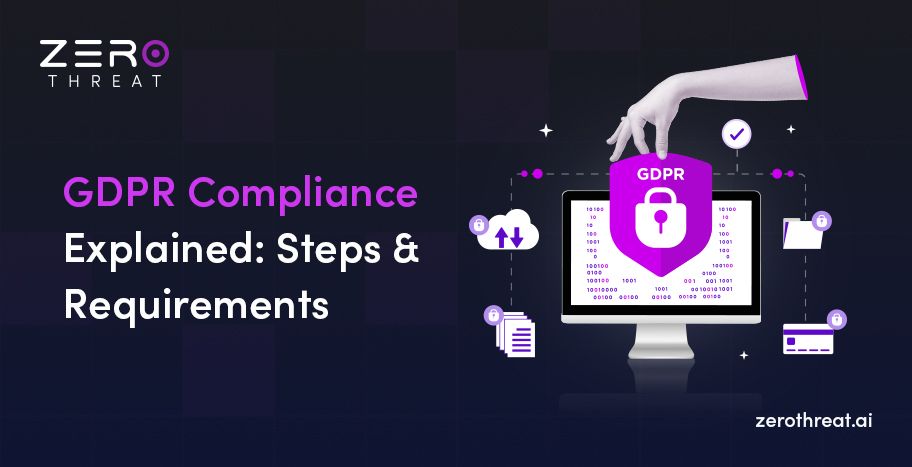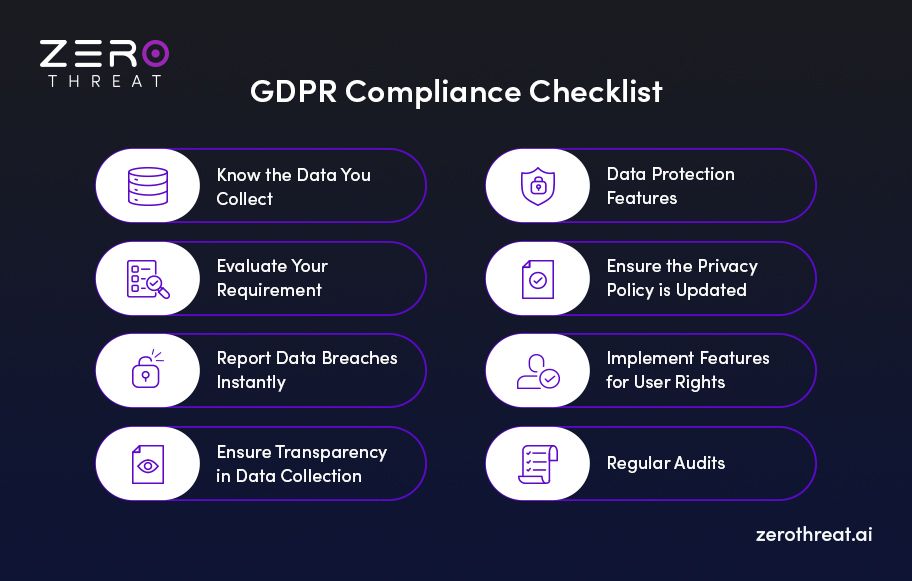All Blogs

Quick Summary: GDPR compliance is a necessary requirement for companies to ensure data protection and avoid heavy penalties. Ensuring compliance with this regulation can be challenging without understanding how it works and what you need to do. This GDPR guide will help you overcome the challenge by providing the necessary information to understand and comply with this law. Read on to meet the compliance.
Data protection is a major concern for individuals around the world today. They use a wide range of applications, websites, and other digital solutions to collect and process their data. In case of a security breach, an attacker can access the compromised data for various malicious purposes.
Therefore, regulations like GDPR help individuals to protect their data. It empowers them by conferring certain rights for data security and privacy. Additionally, it compels companies to take stringent measures for data protection. It makes companies more accountable when it comes to collecting and handling individual’s personal data.
Today, companies need to comply with GDPR requirements to avoid penalties and legal actions. It has become an important regulation that applies to diverse companies that collect and process data of EU/UK citizens. Keep reading to know more about GDPR and how you can stay compliant with this regulation.
Level Up Your Security Audit with ZeroThreat to Ensure 100% Compliance Start for Free
On This Page
- An Overview of GDPR
- Importance of GDPR Compliance
- Rights for Individuals Under GDPR
- GDPR Compliance Checklist
- Role of Security Audit in Ensuring Compliance
- To Wrap Up
What is GDPR?
GDPR (General Data Protection Regulation) is a landmark regulation for protecting the data and privacy of individuals. It is a European Union (EU) regulation that provides many provisions to safeguard the data and privacy rights of individuals within the periphery of EU nations.
In simple words, it is a digital data protection regulation that governs companies and entities that collect, process, and use the personal data of citizens of the European Union. Apart from this, the regulation also covers the entities that transfer data outside the EU.
The regulation also applies to companies outside the EU that collect and process the personal data of EU citizens. Moreover, companies that fail to comply with GDPR are subject to heavy fines and legal action. There are many companies that have been punished under this act.
Meta (formerly Facebook) faced the highest fines of €1.2 billion under the GDPR regulation, followed by Didi Global, Amazon, and many other companies.
Understanding the Importance of GDPR Compliance
GDPR is a stringent data protection law, and it applies to all companies that collect and process data of EU citizens. So, it is natural that if your business has to handle data of EU citizens even from outside the region, you come within the purview of this legislation.
This means that you are obligated to comply with GDPR. For example, your web application is used by EU citizens, which collects certain information from them. So, your web application must comply with the GDPR law. There are significant consequences of not complying with this regulation.
Let’s discuss the consequences you face due to non-compliance below.
Heavy Fines
Severe fines are imposed on companies that fail to comply with GDPR norms. Indeed, the company will have to make a fine of €20 million or 4% of worldwide annual revenue, whichever is higher that further depends on the circumstances and severity of the violation.
Legal Actions
Apart from heavy fines, a company can also face legal action from EU nation-states in case of GDPR violation. Legal action can be initiated against a company if the degree of data breach is high, and the concerned company fails to protect data.
Reputational Damage
Non-compliance with GDPR results in reputational damage, too. Constantly spreading negative news and diminishing stakeholders’ confidence will have a significant impact on your company’s reputation in the market.
What Rights Does GDPR Guarantee to Individuals?
GDPR provides eight rights to individuals that empower them to protect their data and privacy. These rights offer transparency and control over their data. Understanding these rights can help you make the correct decisions to ensure compliance with GDPR. Let’s see these rights in detail.
- The right to be informed: According to this right, companies are obliged to provide information to individuals about the data activities they conduct.
- The right to access: This right emphasizes that individuals are entitled to get information about how their personal data is being used/processed.
- The right to rectification: With this right, an individual can request a company to correct information if there is any mistake or it’s incomplete.
- The right to object: Individuals can make an objection to a certain activity related to their personal data.
- The right to data portability: Individuals can obtain their personal data and transfer it to another controller.
- The right to erasure: It provides the right to delete data when it is no longer needed, or consent is revoked.
- The right to restrict processing: Individuals can stop processing data in some circumstances.
- The right regarding automated processing: It provides protection against automated processing and profiling of an individual’s data.
Uncover Security Loopholes in Minutes and Get Detailed Technical Report with Compliance Issues Give It a Shot
GDPR Compliance Checklist to Comply with This Law
Adhering to GDPR regulation is important to avoid heavy fines and cater to customers in the European Union regions. However, understanding this law and ensuring compliance can be a bit confusing. So, the following GDPR requirements checklist simplifies this task and helps your company align with this regulation.

Know the Data You Collect
Firstly, understand what kinds of data your company collects and how it flows through your internal systems. There are a few important questions to ask to fulfill your GDPR data protection requirements:
- What is the source of data?
- What data is collected?
- What is the reason for collecting the data?
- How is the data processed?
- When is the data removed?
- Is data collected after consent?
- Does the data collected contain sensitive information?
It enables you to know the lifecycle of data within your company. Identify the sensitivity of data to ensure optimal cybersecurity.
Evaluate Your Requirement
To avoid violating the GDPR data protection regulation, your company must collect and process data only if necessary. If the data to be collected is highly sensitive, you must evaluate the requirements through a Data Protection Impact Assessment and Privacy Impact Assessment.
Report Data Breaches Instantly
GDPR requires that a data breach be reported within 72 hours of the incident by both data controllers and processors. Immediate notification about a breach is a requirement to comply with this law. Data processors will report the breach to controllers and the controllers will report it to a supervisory authority.
Ensure Transparency in Data Collection
Transparency in your data collection methods and motives is necessary to stay compliant with GDPR. So, the users of your application or services must be aware of what data you are collecting and for what purposes. It must be displayed to them at all points of data collection, for example, cookie-collection notices.
Data Protection Features
Your applications and systems must have strong data protection features like proper access control, encryption, the use of secure protocols in data transfer, etc. By implementing these features during the application design phase, you can ensure it complies with the GDPR regulation.
Ensure the Privacy Policy is Updated
Make sure that your privacy policy is always up-to-date and easily accessible. Plus, all your customers must get notifications or updates via email whenever there is a change in your privacy policy. The policy must clearly mention the data collected and its usage.
Implement Features for User Rights
GDPR offers many kinds of rights to individuals regarding their personal data, such as requesting correction, deletion, access, and more. Your application must have functionalities to allow individuals to exercise these rights.
Regular Audits
Conducting GDPR compliance audits is crucial to identify any gaps and ensure full compliance with the regulation. The audits will help you discover areas that you need to address to ensure full compliance. The auditing includes evaluating your current position in accordance with GDPR’s requirements.
The Role of Security Audits in GDPR Compliance
Digital Data Protection Regulation is focused on protecting data that is collected, processed, and stored electronically as well as manually. Companies obtain such data electronically when individuals visit their web applications/websites or sign up for their services.
However, if there is any kind of security flaw in these applications or systems it could lead to data breaches resulting in violation of the GDPR act. There comes the role of security audits that help companies evaluate their applications and systems to identify flaws and loopholes to prevent data breaches.
With regular security audits, your company can frequently identify security risks in web apps, APIs, networks, and other digital assets to mitigate cybersecurity threats. It will improve your security posture and enable you to stay compliant with regulations like GDPR.
Ensure 10X Stronger Data Protection by Testing Dynamically to Discover Vulnerabilities Start a Quick Assessment
To Wrap Up
Adhering to GDPR rules is important for companies to ensure that they meet their legal obligations when it comes to collecting, processing, and storing the personal data of individuals. It not only helps them avoid hefty penalties but also maintains the confidence of their stakeholders.
Moreover, security audits are quite helpful in ensuring GDPR compliance. These audits help discover loopholes in applications, systems, and other digital assets to avoid potential cybersecurity breaches. ZeroThreat can help identify these loopholes most precisely because it is a powerful vulnerability scanner that can identify and report vulnerabilities with 98.9% accuracy.
It has an AI-powered crawler to detect even complex security threats precisely and offers detailed technical reports to remediate vulnerabilities effectively. It thoroughly scans web apps and APIs without spending a penning. Sign up for free to check its benefits.
Frequently Asked Questions
What are the different GDPR guidelines?
The following are the key guidelines under GDPR that any entity using personal data must ensure:
- The data is used transparently, fairly, and responsibly.
- The purpose of use should be explicit and specified.
- Accurate and up-to-date.
- Removed when no longer needed.
What do you mean by GDPR compliance?
Does GDPR apply to non-EU companies?
Explore ZeroThreat
Automate security testing, save time, and avoid the pitfalls of manual work with ZeroThreat.


